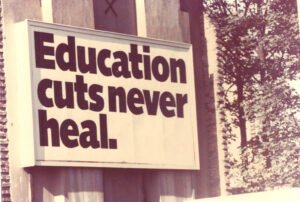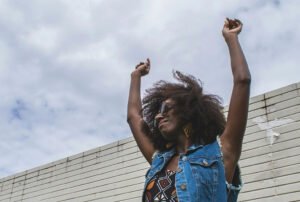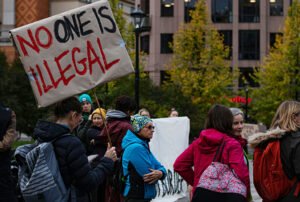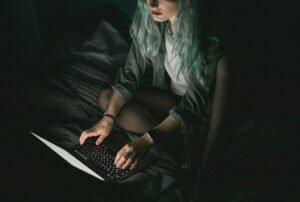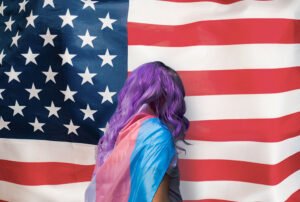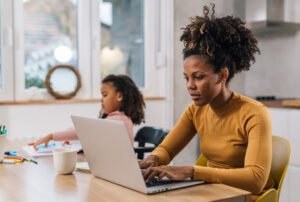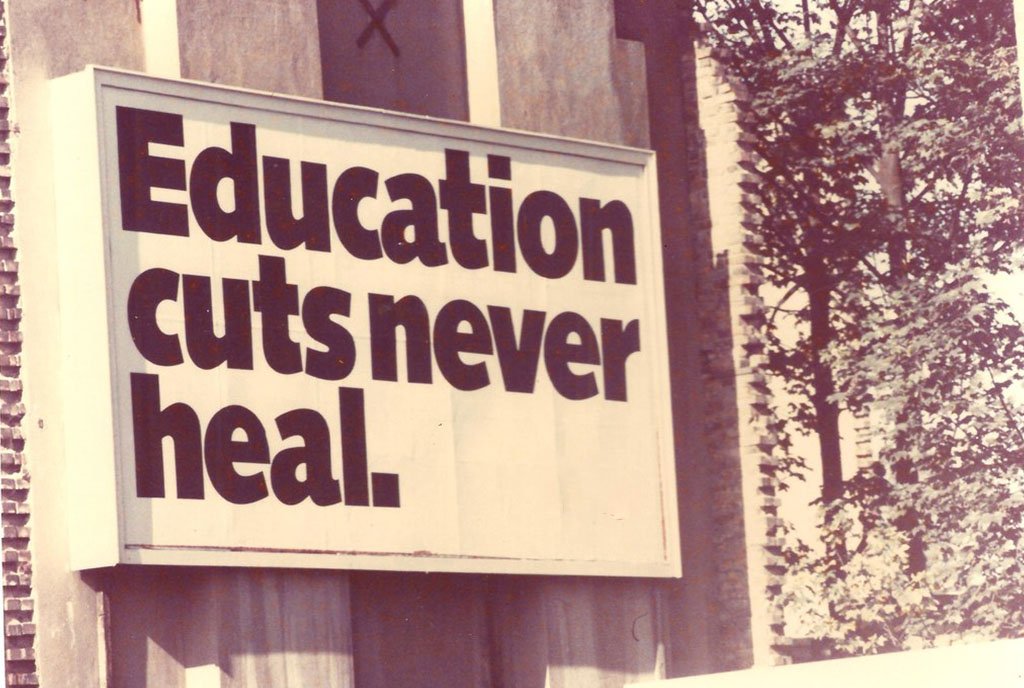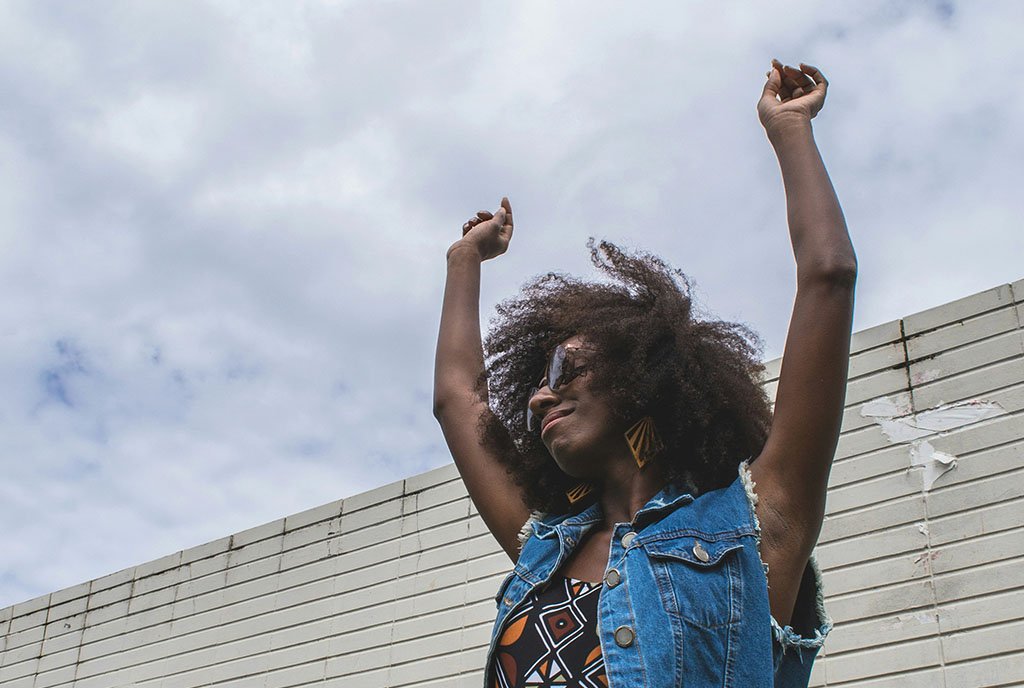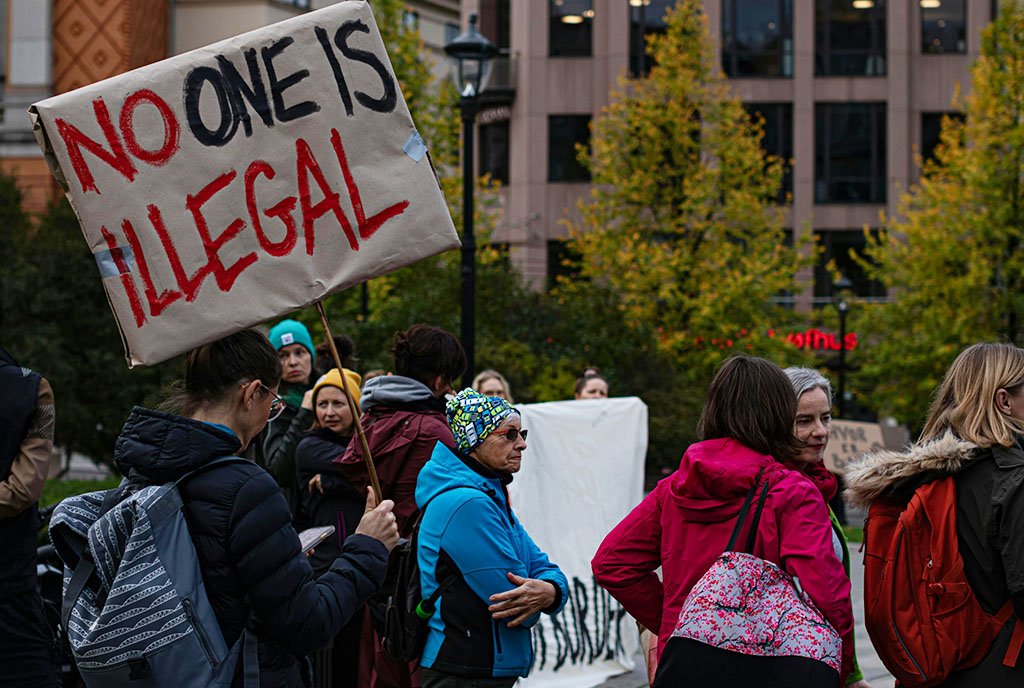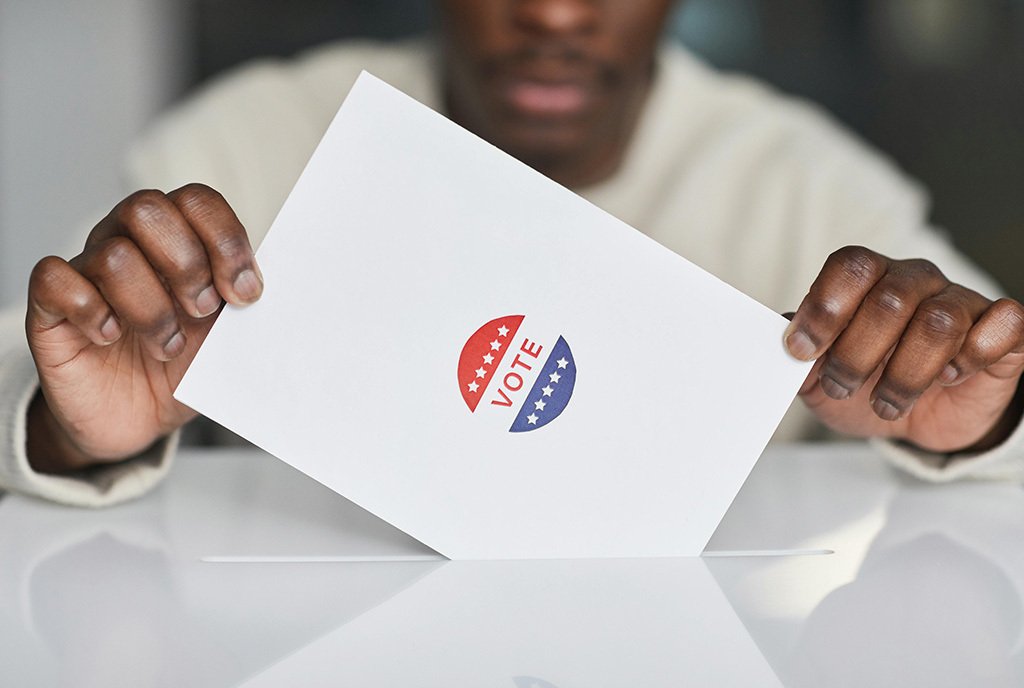
Nearly 10 years after the Movement for Black Lives (M4BL) was founded to uplift the needs and interests of Black people across the country, issues like police brutality and mass incarceration continue to plague Black communities. M4BL is still committed to fighting for better conditions for Black people, including through electoral organizing.
Ahead of the 2024 election, NPQ spoke with Rukia Lumumba, the co-director of M4BL’s Electoral Justice Project, about her work with directly impacted people to advocate for policies that will improve their conditions.
This interview has been edited for length and clarity.
Rebekah Barber: Based on your experiences, why do you believe that electoral organizing is so critical?
Rukia Lumumba: I work at the intersections of the criminal legal system and the electoral governance system. I come from a long family history of organizing for the development of self-determined communities—the ability to improve conditions and increase the political power of Black people to govern themselves. I also come from the lived experience of growing up with community members and family members who have struggled with some of our most vulnerable situations, like addiction, gun violence, lack of adequate housing, and the inability to just make a good living. I’ve also been directly impacted by all those things because of the lack of good policy that protects our basic needs.
I’ve witnessed the police abuse my father, and I’ve also witnessed my brother become a victim of gun violence. My older brother was shot in the head and is currently paralyzed—since he was 21. I’ve seen ineffective policing on many levels, including in investigations. I also have several friends who have experienced incarceration.
We’ve been in this experiment of engaging in the electoral process and governance—and have learned a lot of lessons about the importance of co-governance. I’ve served as a campaign manager, and I’ve also been a candidate myself, so I bring all these experiences into the work that I do.
RB: What are the specific policy concerns of those who are most directly impacted by things like gun violence, addiction, and incarceration?
RL: Our safety and security are a priority to us. We have a very complicated relationship with the police. We have a mistrust and a fear of calling the police, even in times of crisis, because far too many people in need of community and mental health support have instead been met with violence. This year alone, already over 1,000 people have been killed by police, according to the Mapping Police Violence report—and that number only continues to rise.
When thinking about our safety, we think about the rise in Cop Cities across the United States. It’s now expected that 72 cities will have a Cop City in the next year. I look at the city that I live in, Jackson, MS, where our Cop City looks like the expansion of the state militarized police force across the entire city, as opposed to where it initially started in a small, less than 10-block radius.
“We’re thinking about the ability to move people into office who don’t just look like us but also think like us.”
That type of safety impacts our ability to feel comfortable in the place we call home. I get concerned about my son and godchildren driving down the street as teenagers or young adults. I never had that fear before.
Folks are also talking about the ability to have alternative crisis response—looking at what it means to be able to call a mental health provider based in the community, a trained social worker and counselor, as opposed to calling the police, when you’re in need of crisis support.
We’re not talking about one that brings law enforcement with [them] but one that is trained in deescalation. We’re talking about maybe incorporating violence interrupters and mental health professionals who care about deescalation and not about criminalization.
People are asking for those things, and they want actual examples of what the alternatives to police look like. We see them working in many places. I think about the Anti Police-Terror Project in California, which has a mental health-first crisis response program.
RB: How does your electoral strategy tie into the longer-term goals of the Movement for Black Lives?
RL: We’re thinking about the ability to move people into office who don’t just look like us but also think like us—who believe in the policies and the practices of co-governance and community-led initiatives and common-sense policies that save lives and create better conditions for all people.
“We can organize in the street, we can organize for policy changes, but it is also critical that we also organize towards the polls.”
We’re also looking at what it means to create a true democracy in this country, that is not built on an electoral college but on “one person, one vote.”
What does it look like to challenge this two-party system and give them a fair opportunity to vote for candidates that will meet their needs? What does it look like to expand how we engage in voting in this country?
We’re looking at more than just what it means to elect the lesser of two evils. We’re looking at what it means to transform this country’s electoral process so that our people can fully participate in a democracy and in their own governance.
RB: The Movement for Black Lives has been around for about 10 years. Can you discuss some of the organizing lessons learned, specifically as they relate to electoral organizing?
RL: I think the biggest lesson is that we can organize in the street, we can organize for policy changes, but it is also critical that we also organize towards the polls.
We must be fully engaged in the electoral process. It is another tool in our arsenal and a key process to any strategic plan for increasing the likelihood of achieving better conditions for Black people.
Sign up for our free newsletters
Subscribe to NPQ's newsletters to have our top stories delivered directly to your inbox.
By signing up, you agree to our privacy policy and terms of use, and to receive messages from NPQ and our partners.
We learned that we must engage in it and that when we engage in the electoral process, we must focus on creating the best chance to vote for the best conditions for our people rather than choosing between the lesser of two evils. When engaging in the electoral process, we are engaging in it to figure out what harm reduction can occur here.
Yes, we’re helping to support the training and development of people to serve as campaign managers of our Electoral Justice League (M4BL’s training program) or campaign managers for the movement. But more important than all of that, we’re trying to help people understand and have the information to make informed decisions about the candidates that will improve their conditions.
We are also really concerned about not just looking at [presidential] candidates but looking at down-ballot races and what is happening in local elections—from your governor down to your county supervisor, down to your clerk of the court.
We also uplift the importance of understanding ballot initiatives. We’re talking about abortion, medical marijuana, and Medicaid expansion. We’re also making sure that we’re touching all those issues because they touch our lives. And often, as Black people, we’re more impacted than anybody by poor policies.
“A big part of what we do is help establish electoral justice infrastructure everywhere Black people are located.”
RB: What do your electoral organizing strategies look like?
RL: Electoral organizing wasn’t a big part of the Movement for Black Lives when we started nearly 10 years ago. Actually, it was something that people frowned upon, especially organizers. People don’t believe in this electoral system. We’ve been harmed by it over and over again.
But in 2017, we convinced the movement to try it. We wanted to see what we can do when we go back to that movement that Fannie Lou Hamer and Medgar Evers and so many others fought to begin to experiment with their political power.
In 2017, we formed the Electoral Justice Project as a table of the Movement for Black Lives to create a loving and strategic home for Black people to build political power. A big part of what we do is help establish electoral justice infrastructure everywhere Black people are located. For example, we have what we call our Electoral Justice League. This year, we call it our People’s Response Fellowship. We train organizations—their members and staff—to lead electoral justice campaigns. We have 20 c3 and c4 organizations that are currently doing that.
We also realized that there were few Black-led c4 organizations across the nation. We dedicated our resources and time to help build Black c4 political infrastructure throughout the United States. This year alone, we have helped more than 35 organizations stand up their c4 and c3 electoral justice work across the nation.
We’ve been working to educate, motivate, and organize the field. We are currently pushing out our community safety town halls in partnership with 40 organizations we’re working with across the nation, that focus on educating community members about policing alternatives while educating them about where the candidates stand on those issues, both in the federal elections as well as in local elections.
We have also been intentional about movement and electoral alignment. We have several partner organizations with which we’ve been working strategically within multiracial and multiclass movement alignment. We’ve been working with the Working Families Party, Seed the Vote, and SURJ (Showing Up for Racial Justice). We are also part of the Black Power Voter Alliance, comprising groups like Community Change, State Voices, Color of Change, Black Voters Matter, and several others.
We are one of the founders of The Frontline. As part of this partnership, we hosted election defense training and support for organizations in need. We’ve also been allied with the Uncommitted Movement to support their efforts to move candidates toward supporting a ceasefire [in Gaza] and an arms embargo [on Israel].
RB: The Movement for Black Lives has always been allied with the Palestinian struggle. Why is this alliance so critical to your work?
RL: We’ve always understood the connection between the liberation of Palestine and Palestinians and the liberation of Black people. It’s always been a connected movement because there has always been an attempt to dehumanize and decrease the power and capacity of people to lead their own governance and to [extract] resources and land from them. We know what that feels like here in the US—when we’re criminalized for just living.
In 2016, we began our learning and education on the Palestinian struggle. We have been in solidarity with Palestine even prior to that. Before establishing M4BL, many of our organizations were in solidarity with the Palestinian movement.
We know what it is to have our loved ones killed. We know what it is to not receive justice or protection. What we see happening in Palestine is a human rights violation. It is a genocide.
We’re calling for an end to a war on Black people here in the United States. We’re fighting for an end to police violence. We’re fighting for the end to mass criminalization and incarceration of our loved ones who are spending life behind prison walls for minor offenses and even violent offenses that don’t call for that. We see so many innocent Black people executed through the death penalty.
We are fighting for human rights and dignity here in this country, but we must also fight for it everywhere we see harm happening. Palestine is one prime example of that genocide occurring. We see it in Sudan. We see it now in Lebanon. We see it in the Congo. We see it in Haiti.
These are places where Black people have sought to seek their independence. We all have a right to be independent, develop, self-govern, and lead….We can’t deny people a right to their liberation, and we can’t support the genocide of people in the name of capital gain.
RB: Is there anything else you would like to share?
RL: We want to increase our people’s desire to participate in this election. Many politicians have used fear and frustration to secure Black people’s votes rather than addressing the violent conditions we have endured and presenting a new, hopeful vision for the future of our country. We need to challenge what politicians have done and move our people for something better.



